Perhaps the West was collectively blinded by triumphalism after the end of the Soviet Union and the cold war and the subsequent humiliation of Russia. Perhaps it was simply an (understandable) failure of imagination to believe that anyone was capable of launching such an attack on Ukraine.
Yet it is not as though Vladimir Putin did not alert the West; more than once. The collapse of the Soviet Union was “the greatest geopolitical catastrophe of the century”, he told Russians in 2005.
Two years later, he railed against the West, and the US in particular, in a speech to the Munich Security Conference. “The process of NATO expansion has nothing to do with modernisation of the alliance,” he said, adding: “We have the right to ask, ‘Against whom is this expansion directed?’”
Putin and his foreign minister, Sergei Lavrov, have also of course unsurprisingly pointed to Nato-backed air strikes on Serbia and Libya, and the invasion of Iraq in 2003.
Arguments still rage about what assurances Western leaders actually gave to Russia after the unification of Germany and Nato expansion eastwards.
Did, as has been reported, Helmut Kohl, the then German chancellor, tell Soviet leader Mikhail Gorbachev in 1990: “We believe that Nato should not expand the sphere of its activity”, and what exactly did he mean by that?
James Baker, the US Secretary of State, is reported to have told Gorbachev: “Before saying a few words about the German issue, I want to emphasise that our policies are not aimed at separating Eastern Europe from the Soviet Union”.
Whatever promises were made, they were not written down in a treaty. A final agreement signed by Russia and the West in September 1990 applied only to Germany.
Accusations of betrayal were not confined to Putin. His predecessor Boris Yeltsin told US president Bill Clinton in 1993 that expansion of Nato eastwards breached the spirit of the 1990 treaty.
A senior German foreign ministry official told the US state department that Yeltsin’s complaint formally was wrong, but he could understand “why Yeltsin thought that Nato had committed itself not to extend beyond its 1990 limits”.
‘Very important to Russia’
Whatever was or was not said, and in what context, Ukraine is regarded as a special case, something widely accepted, not least by senior Western military figures.
“As much as we admire the Ukrainians,” the former head of the British army Lord Richard Dannatt said, “I don’t believe they should be part of Nato, because spiritually and emotionally they’re too close to Russia. And I think it’s a provocation of the Russians too far.”
The former chief of defence staff, Lord David Richards, was asked in 2014, after the Russian annexation of Crimea, if there was a viable military option for the West against Russia.
He replied: “Obama and Cameron have said we’re not going to go to war over Ukraine and I think that’s right. We have to understand that Ukraine is very, very important to Russia, emotionally, historically, it was part of Russia for hundreds of years, which is why they were never going to allow Crimea to become part of this new Ukraine.”
“I don’t believe they should be part of Nato.”
In his interview, Richards criticised the “liberal Western media” for turning a blind eye to the fact that former Ukrainian president, and Putin ally, Viktor Yanukovych was elected in a free election and in 2014 removed from office without due process.
They would have made much more of a fuss, Richards said, “if it was someone else, which I always find a little bit bizarre”.
A scholar with a special insight into Putin’s Russia has described Putin’s inner circle – the “siloviki” (or “men of force”), mainly from the former KGB – and Ukraine’s special place in their commitment to the idea of Russia as a great power.
As Western governments indulged in, indeed benefitted from, what has been called Russia’s “gangster capitalism”, Western intelligence agencies and diplomats – including the British – seriously misread Putin and the resentment that followed the break-up of the Soviet Union that runs deep in the Russian population well beyond Putin’s circle.
The Minsk peace agreements of 2014 and 2015 broke down over the definition of Ukraine’s sovereignty. Russia insisted this should be limited, with the Donbas region in eastern Ukraine able to block Kyiv policies.
One answer could have been a clearly-defined Ukraine federation based on the twin, compatible, principles of self-determination and territorial integrity that guarantees Ukraine’s security and neutrality. That may still be the only way to reach a settlement ending the bloodshed.
Sanctions
British ministers, meanwhile, indulge in aggressive rhetoric, claiming Britain is “in the vanguard” in applying economic sanctions, forgetting London’s role in indulging Russian oligarchs. Britain has been slower than the EU or the US to impose sanctions while erecting bureaucratic obstacles in the way of Ukrainian refugees, even those with family links in Britain, from seeking refuge in the country.
Britain dished out “golden visas” to Russian oligarchs who have been gobbling up properties and British companies. Just 13 Russian individuals in Britain have a combined wealth of £69.5 billion and nearly 7,000 British companies are either owned or controlled by the Russian state.
According to Transparency International, £1.5 billion worth of British property is owned by Russians accused of financial crime or linked to the Kremlin, and mostly owned via offshore companies.
Elements in the British political establishment have welcomed Russian billionaires including one wanted by the FBI in the United States.
Donations
It is estimated that donors who had made money from Russia or Russians have given £1.93 million to the Tory party and its constituency associations since Boris Johnson became prime minister.
The biggest single donor is the financier Lubov Chernukhin, who has given £700,000. At the Conservative party’s fundraising ball two years ago, she won the prize of a game of tennis with Johnson.
She is a British national and married to Vladimir Chernukhin, formerly Putin’s deputy finance minister.
A report by the parliamentary Intelligence and Security Committee (ISC), blocked by Johnson for nine months and not released until well after the 2019 general election, described how Britain welcomed Russian money, asking few, if any, questions about its provenance.
“£1.5 billion worth of British property is owned by Russians accused of financial crime or linked to the Kremlin.”
The ISC noted: “It is not just the oligarchs… The arrival of Russian money resulted in a growth industry of enablers – individuals and organisations who manage and lobby for the Russian elite in the UK.”
It added: “Lawyers, accountants, estate agents and PR professionals have played a role, wittingly or unwittingly, in the extension of Russian influence which is often linked to promoting the nefarious interests of the Russian state.”
The ISC went on: “Several members of the Russian elite who are closely linked to Putin are identified as being involved with charitable and/or political organisations in the UK, having donated to political parties, with a public profile which positions them to assist Russian influence operations. It is notable that a number of Members of the House of Lords have business interests linked to Russia, or work directly for major Russian companies linked to the Russian state.”
The British state has learned a lesson, and may finally be getting serious about sanctions and money laundering.
But we must not allow it to make up for any guilt for past greed and bad judgment to plunge us into a deeper conflict fed by irresponsible rhetoric and in turn feeding Russian paranoia.




